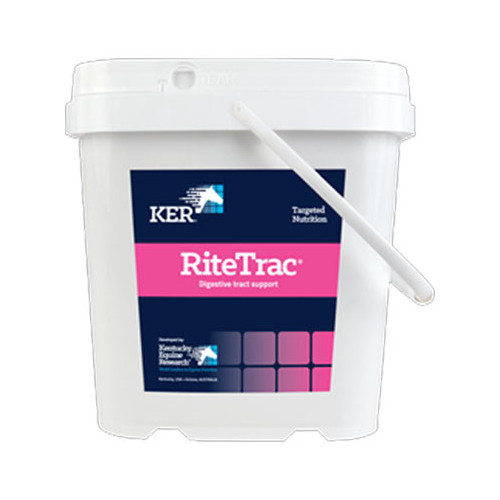The antacids contained in RiteTrac rapidly neutralize the acid secreted in the stomach, providing a more pH-neutral environment between meals.
Modern equine management practices have resulted in horses being exposed to situations vastly different to those in which they evolved, including solitary stall confinement, limited grazing, grain as an energy source, and meal feeding. These environments and management practices, although convenient to caretakers, have the potential to be less than optimal for the horse’s health and performance. One debilitating condition influenced by modern horse management is ulceration of both the stomach and colon. It is estimated that nearly 90% of horses suffer from gastric ulcers, and more recent research has shown that over 60% of performance horses suffer from colonic ulcers. Approximately 54% of performance horses suffer from both gastric and colonic ulcers, leading to compromised health and decreased performance.
RiteTrac Promotes Stomach Health
Once thought only to affect elite equine athletes, gastric ulcers are prevalent in all sectors of the equine population — from broodmares to ponies, racehorses to show horses. Nearly every horse is at risk. Unlike humans, horses continuously secrete gastric acid, and ulcers are the result of erosion of the stomach lining due to prolonged exposure to this gastric acid. Risk factors include stressful situations, intermittent meal feeding, stall confinement, high-grain diets, transport, intense exercise, and chronic administration of nonsteroidal anti-inflammatory drugs. Horses that go for long periods of time without feeding are especially vulnerable.
Due to the prevalence and severity of equine gastric ulcers, there has been much research into methods to prevent gastric ulceration in horses. Initially, gastric ulcers were thought to most commonly occur in the sensitive nonglandular or squamous region of the stomach, but recent research has shown otherwise. A Danish study of 201 horses of mixed age and type (including foals, broodmares, and performance horses in light and heavy work) reported an 83% incidence of gastric ulcers. In addition, 32% of the population had ulcers only in the nonglandular region, 17% had ulcers in the glandular region only, and over 50% had ulcers in both the glandular and nonglandular regions.1 Additionally, researchers have shown that gastric ulcers can affect physiological factors influencing performance such as maximal oxygen uptake.2 Signs of gastric ulcers include loss of appetite, weight loss, colic, poor coat, difficult behavior, and decreased performance.
The antacids contained in RiteTrac rapidly neutralize the acid secreted in the stomach, providing a more pH-neutral environment between meals. Similar compounds have also been shown to have a role in alleviating clinical signs in horses with severe ulceration.
Protects the Sensitive Equine Hindgut
The hindgut of the horse contains beneficial bacteria required for the digestion of fiber. The environment in which these bacteria flourish is easily disrupted when horses consume significant amounts of soluble carbohydrates, which are present in lush pasture and grain, and are rapidly fermented in the hindgut. The primary effect of this excessive fermentation is a serious reduction in the pH of the hindgut environment through accumulation of lactic acid. Disruption of this delicate hindgut environment can result in hindgut acidosis, characterized by decreased forage digestion, general digestive upsets, and production of endotoxins (which can cause a number of serious conditions including laminitis and colic).
Average Rating
Write a Review
Write a Review
- Kentucky Equine Research
- Digestive Support
- 3kg







